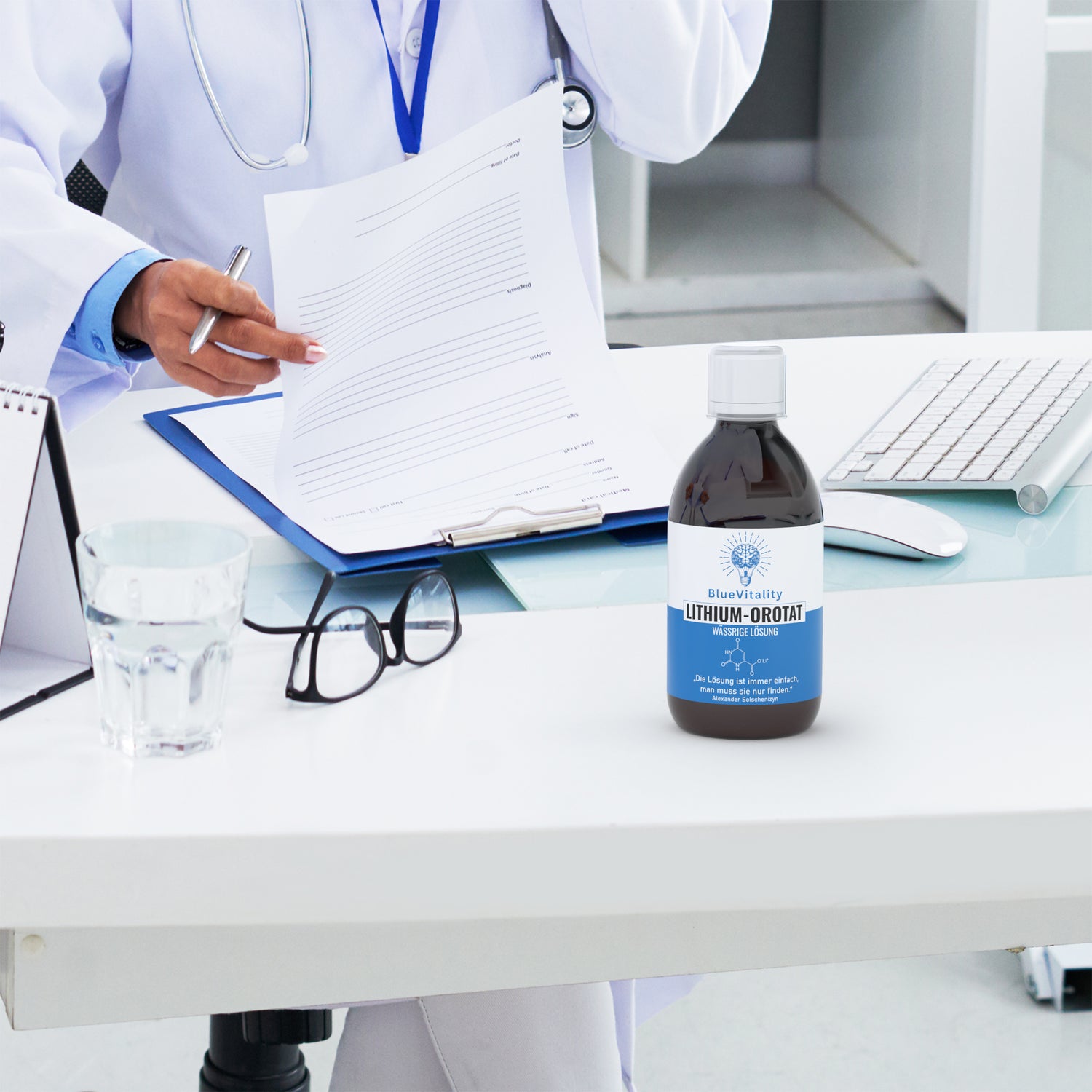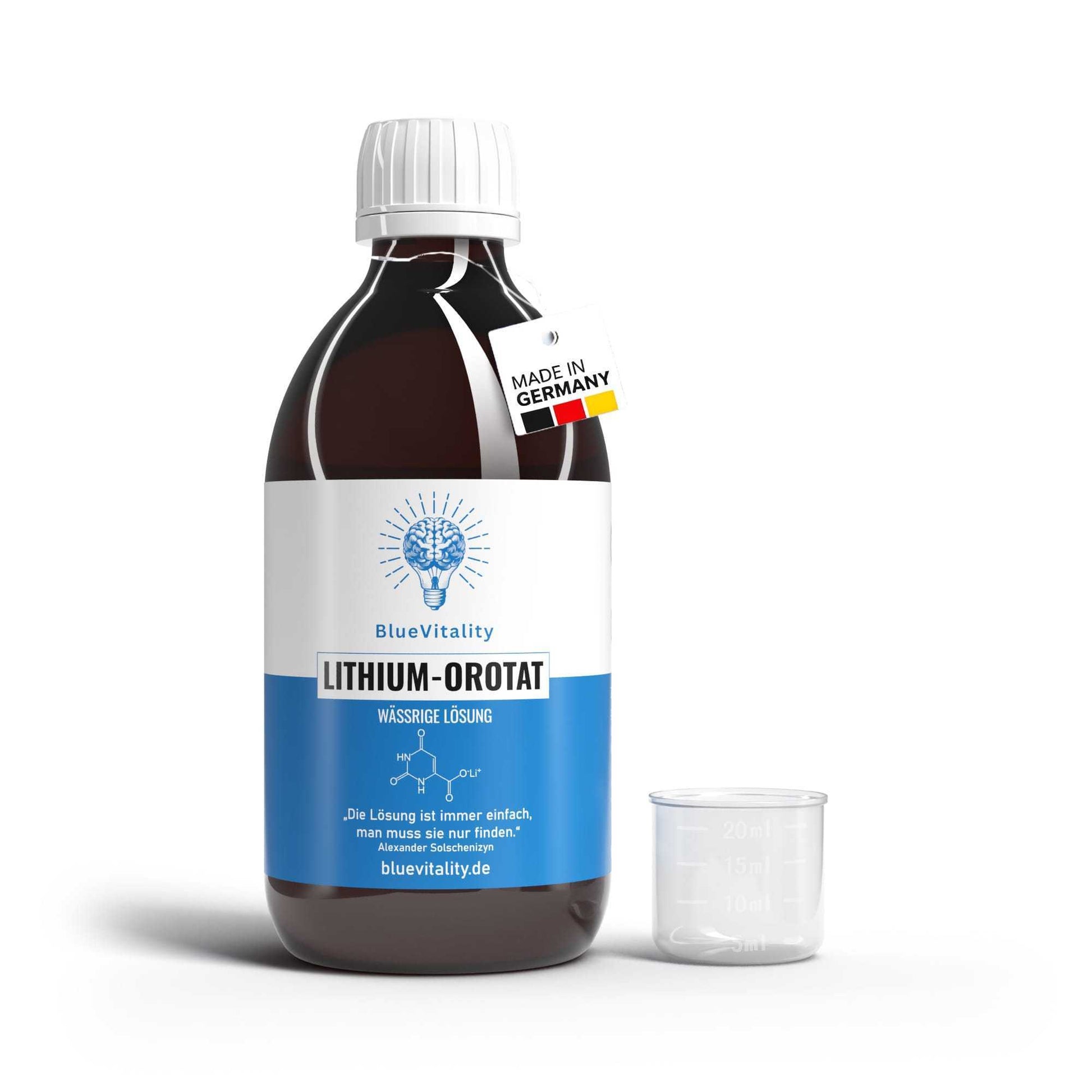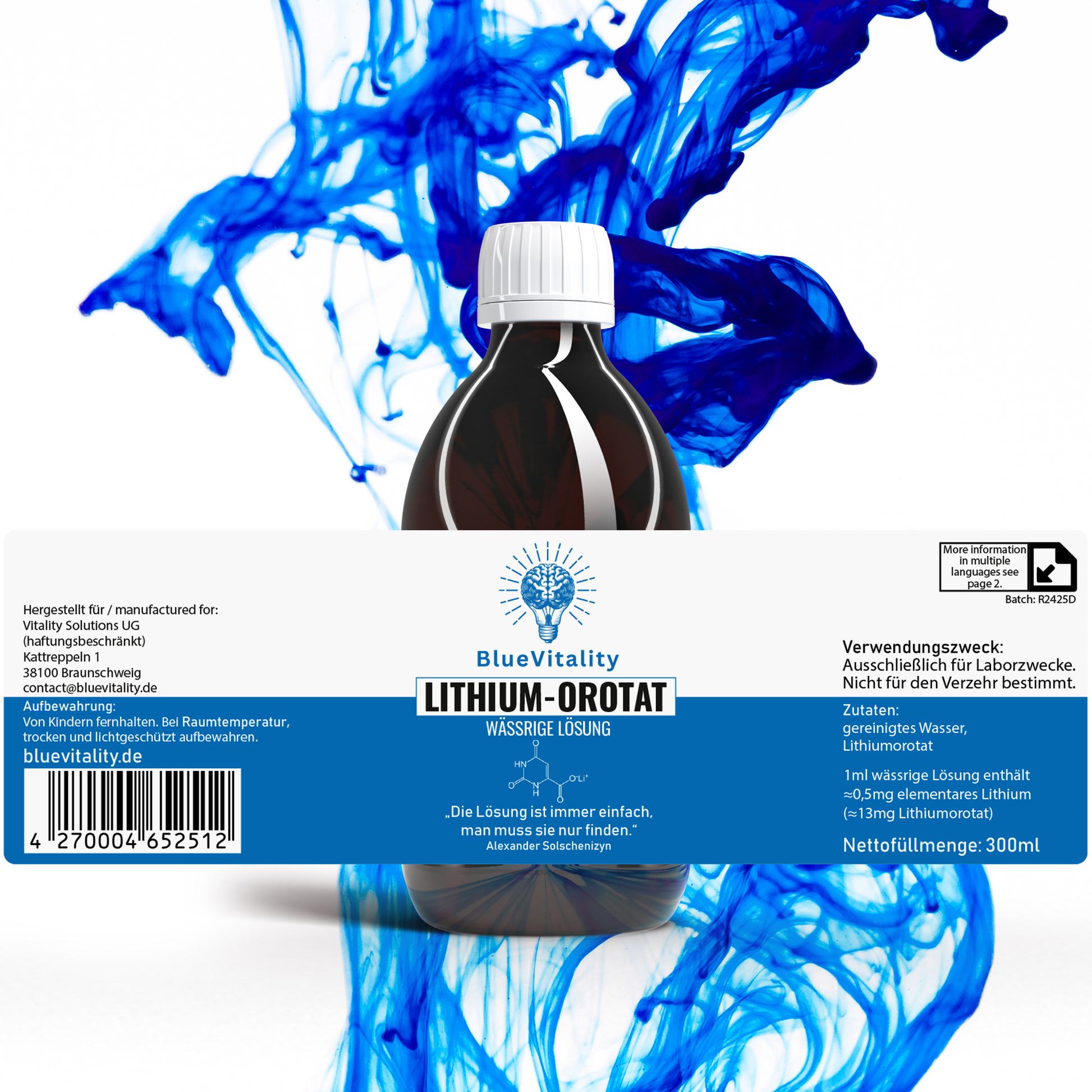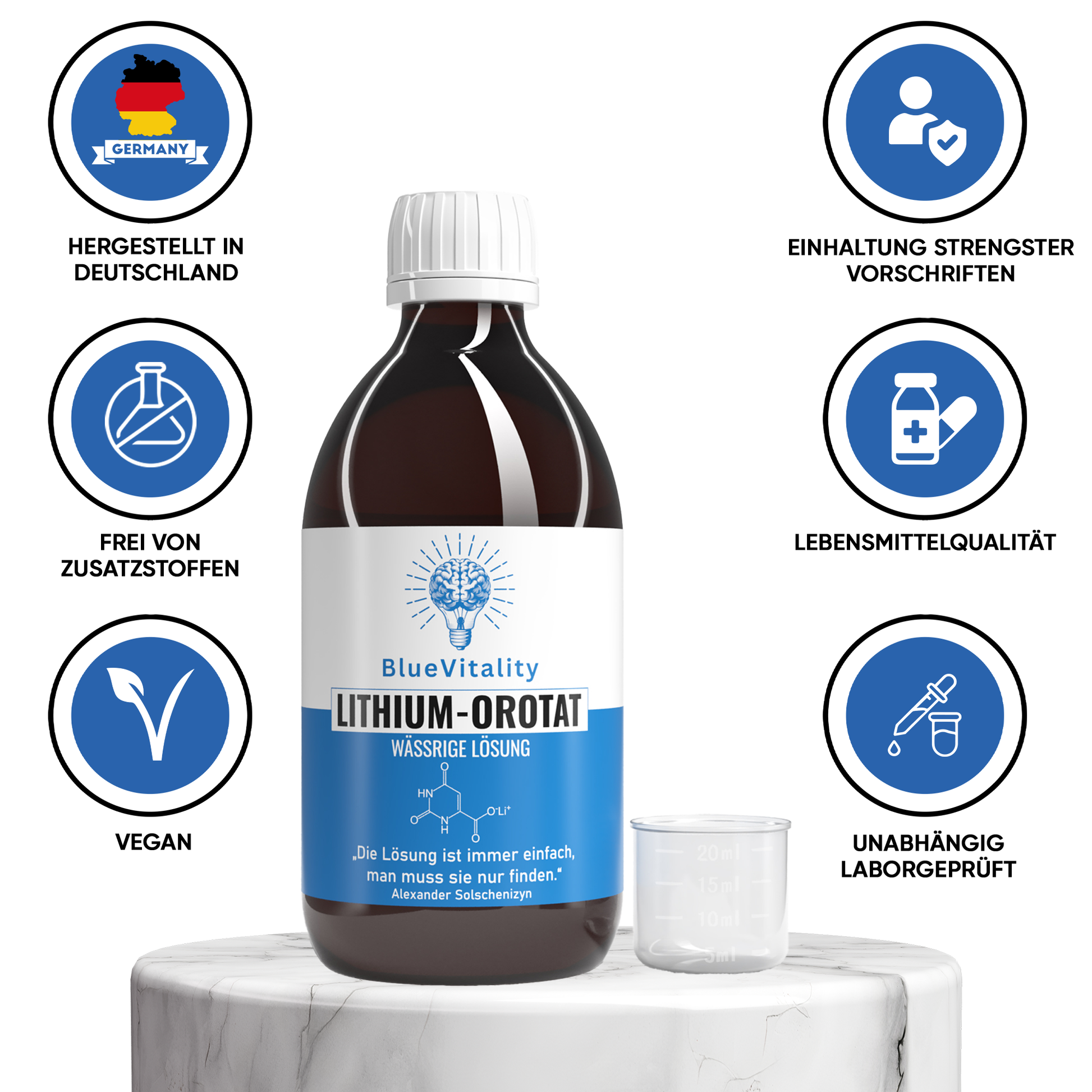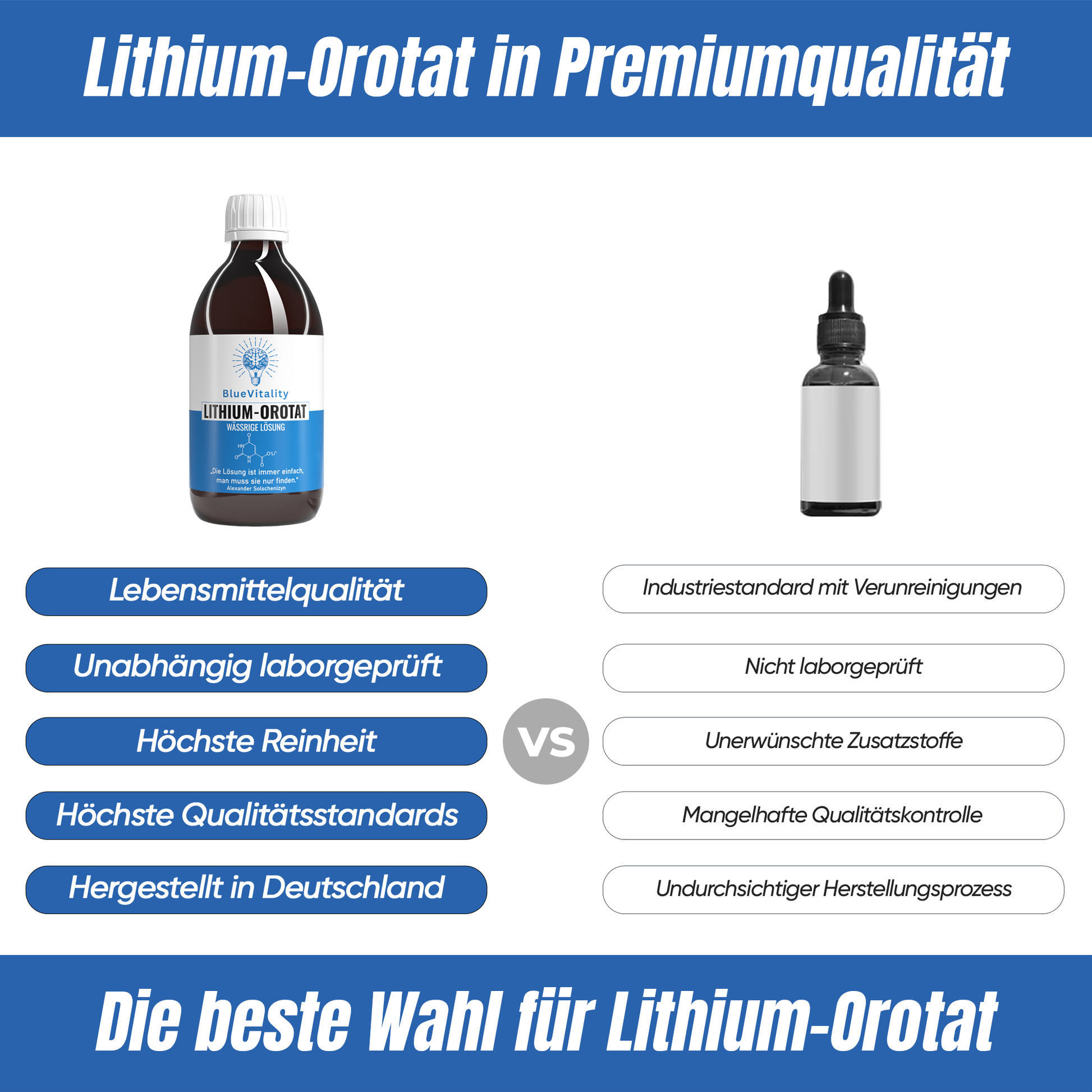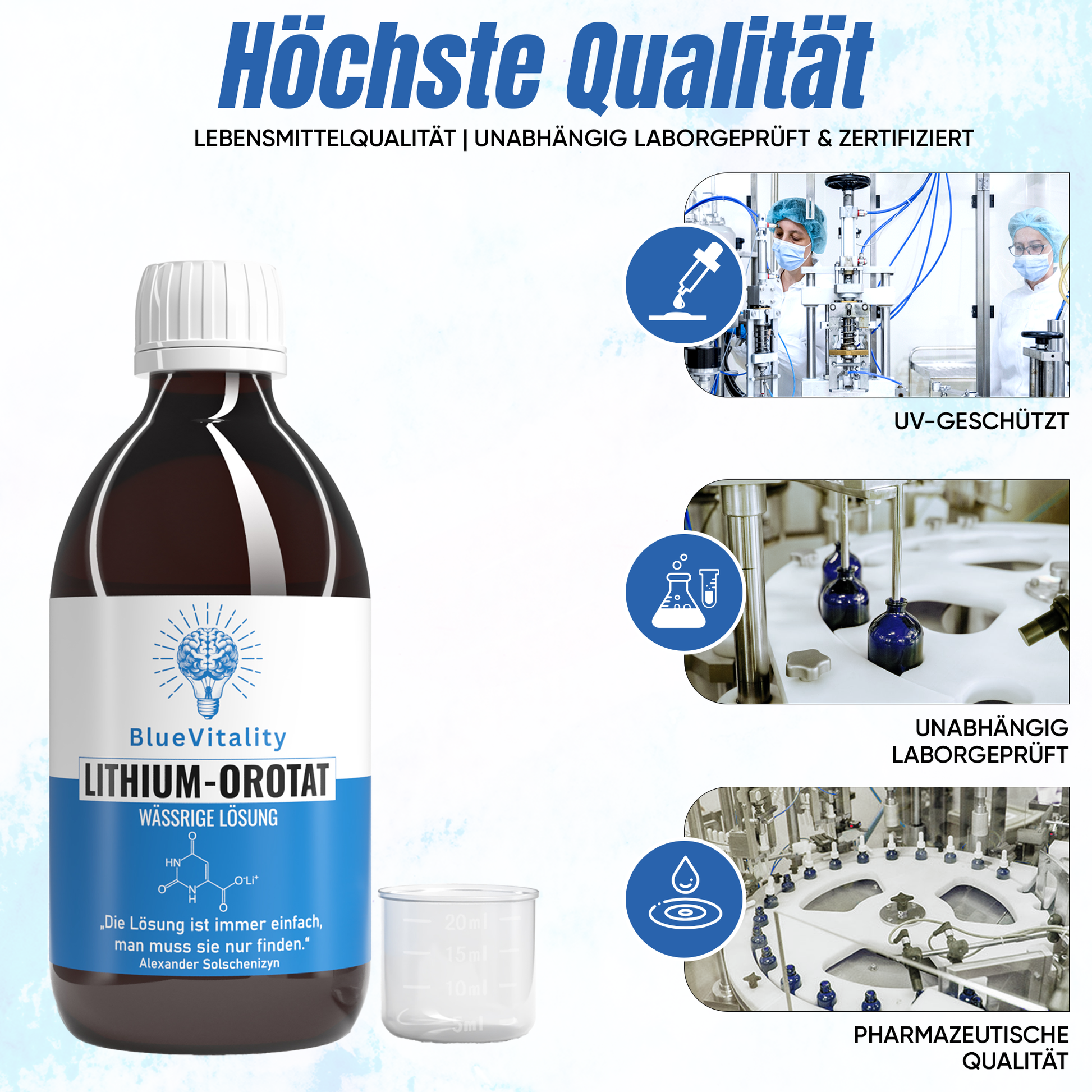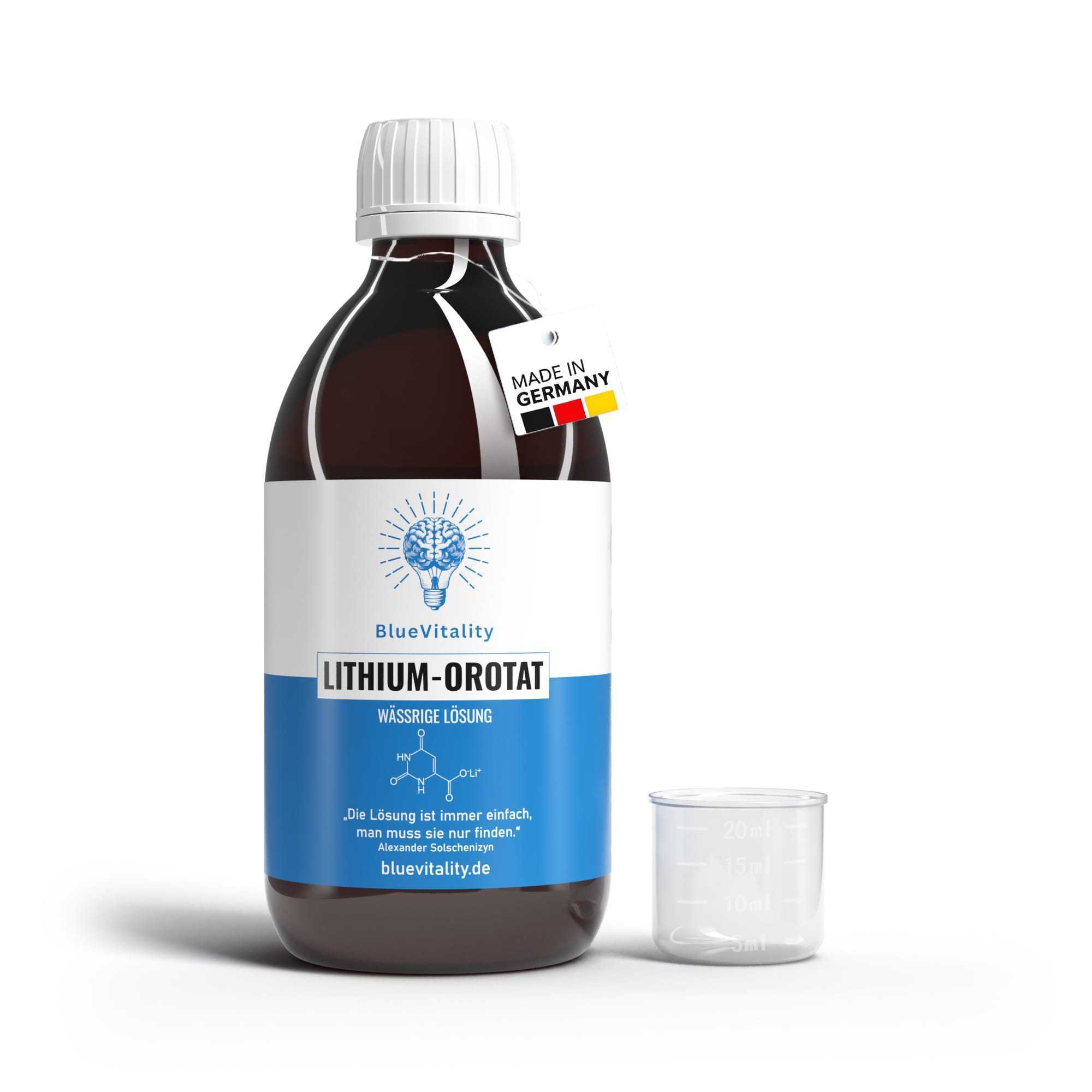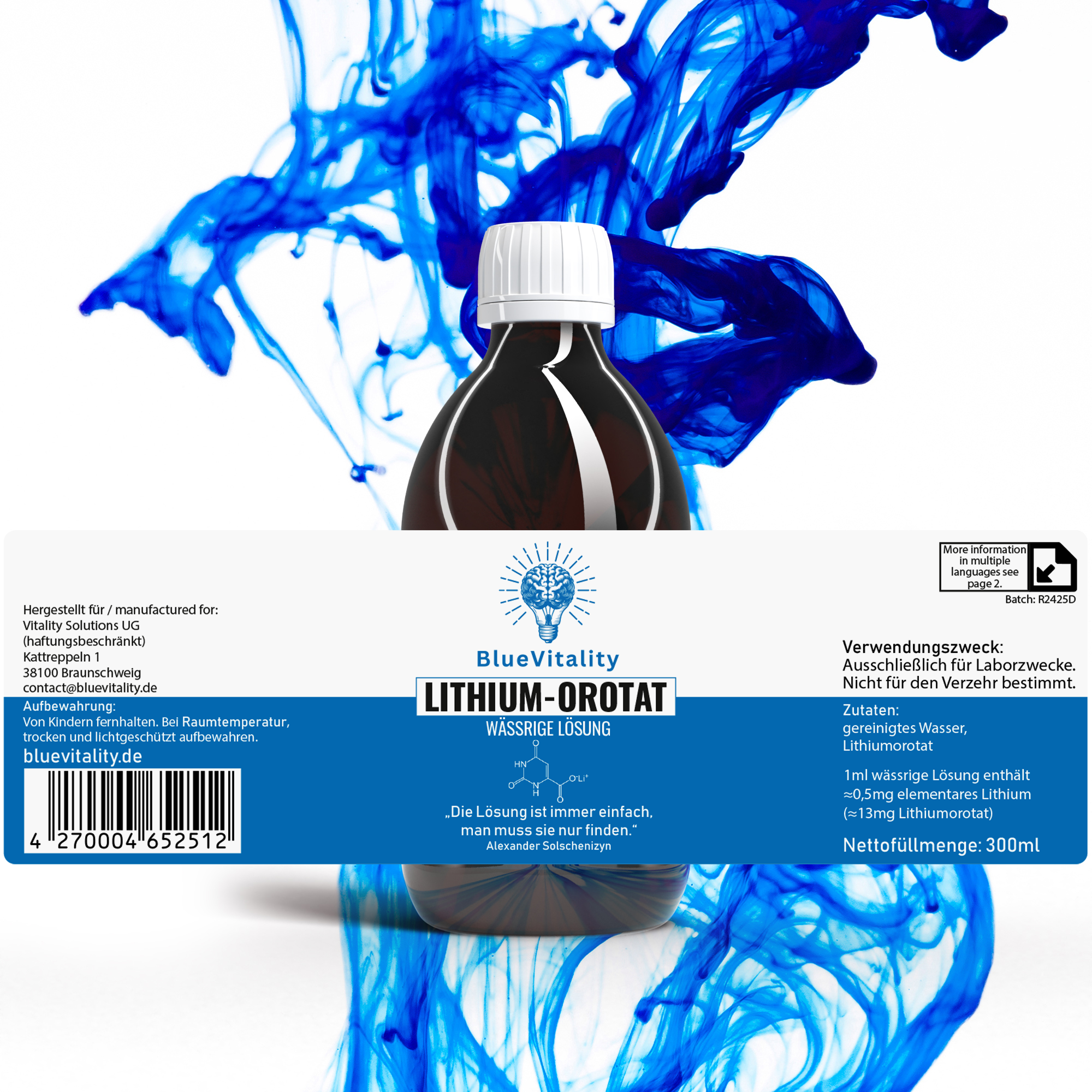Lithium orotate is a special form of lithium that is receiving increasing attention in research and the healthcare world. Here you'll find in-depth information, fascinating studies, and frequently asked questions – presented in an understandable and scientifically sound manner.
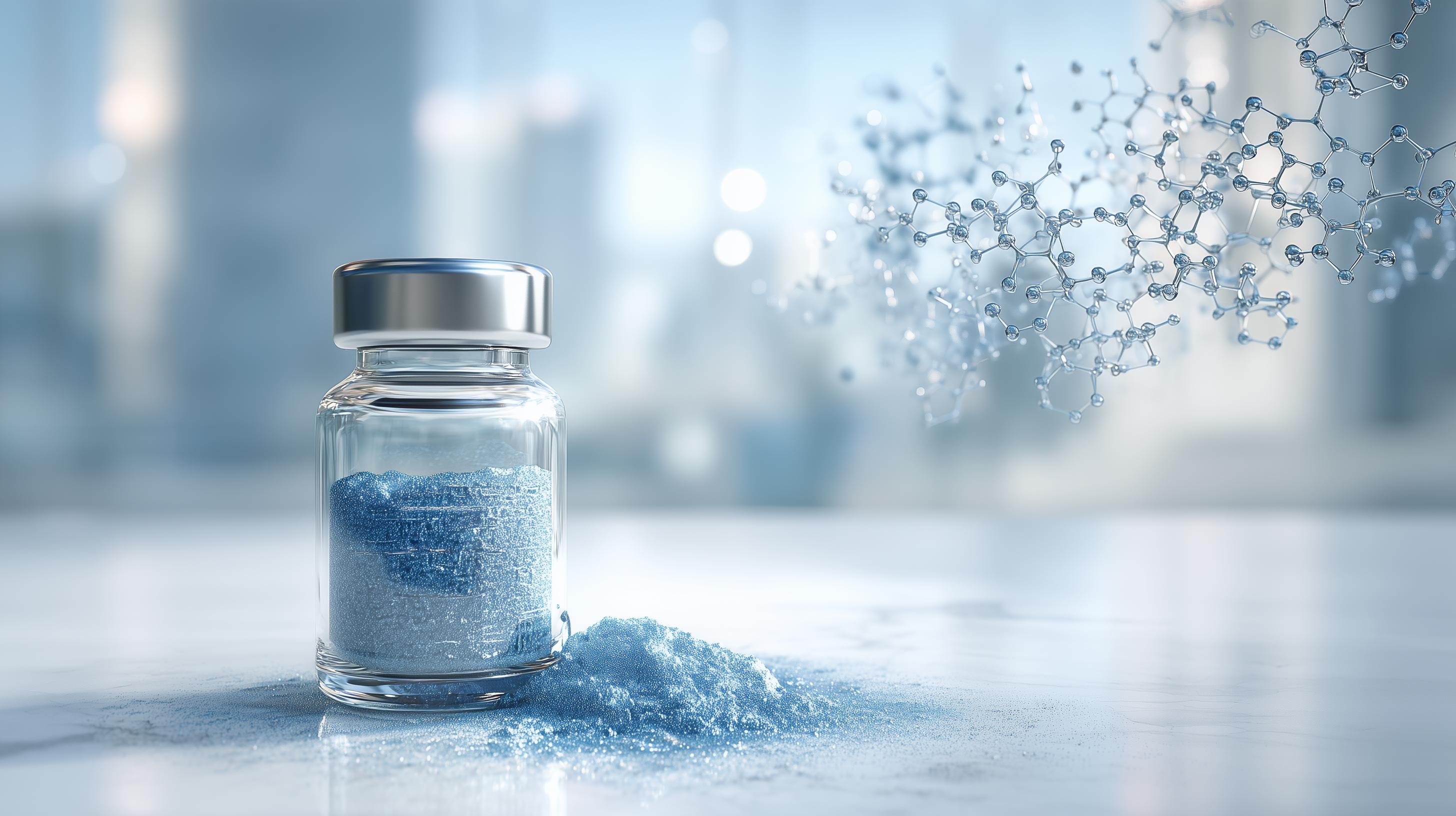
What is lithium orotate?
Lithium orotate is a compound of the mineral lithium and orotic acid , a naturally occurring substance that is also produced in the human body. Unlike prescription lithium salts such as lithium carbonate, lithium orotate is used in much lower doses and is available as a dietary supplement in many countries. It is primarily used to support mood , promote emotional balance , and in some cases, improve cognitive function . Proponents argue that the orotic acid allows for improved cellular uptake of the lithium, meaning even small amounts could be effective.

Since when has lithium been used?
Lithium has been used medicinally since the 19th century. The first reports of its use date back to the 1840s, when it was used to treat gout—back then based on the theory that excess uric acid caused many diseases. From the 1940s onwards, lithium was increasingly used to treat mood disorders , particularly bipolar disorder . Modern psychiatry has since considered lithium one of the first effective mood stabilizers . Lithium orotate as a specific compound became popular in the 1970s, particularly through the work of physician Dr. Hans Nieper, who recommended it as a well-tolerated and low-dose form of lithium.

How is lithium used?
In medicine, lithium—usually in the form of lithium carbonate or lithium citrate —has been used successfully for decades to treat bipolar disorder and affective disorders . It is always administered under medical supervision, as the effective dose is close to the toxic limit.
Lithium orotate differs from these high-dose lithium salts: it contains only very small amounts of elemental lithium and is offered as a low-dose dietary supplement in some countries outside the European Union .
There it is mainly used to support mood, inner balance and cognitive function .
In Germany and the EU, lithium orotate is not approved as a food supplement and must not be taken .
Our lithium orotate is offered exclusively for laboratory and research purposes .
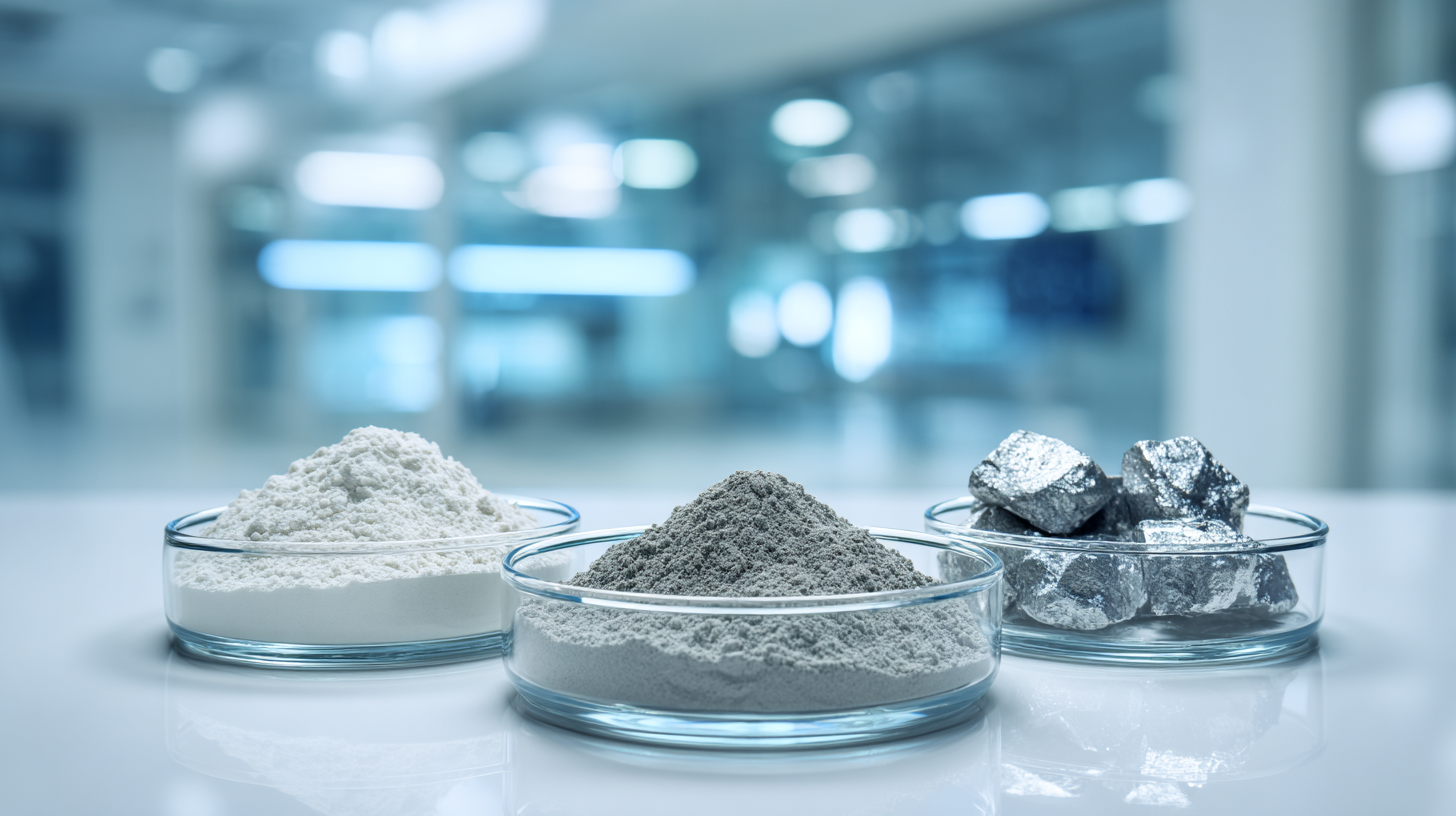
What are the differences in lithium?
Not all lithium is the same.
Depending on the compound and purity, the effect, application and tolerability vary considerably.
🔬 Different forms of lithium:
-
Lithium carbonate: Used medically to treat bipolar disorder. Prescription only and strictly monitored because high doses are required.
- Lithium citrate: Also used medicinally, often in liquid form and somewhat gentler on the stomach, but with similar precautions.
- Lithium orotate: A special compound of lithium and orotic acid. Contains significantly less elemental lithium and is used in low doses outside the EU for mood support.
🧪 Purity & Quality: Lithium compounds are available in varying degrees of purity – from technical grade to ultrapure laboratory standards with over 99% purity . Only tested, analyzed products (e.g., with a COA certificate) guarantee maximum quality and safety.
FAQ
Is lithium safe?
Is lithium safe?
Important note: Lithium orotate is not approved as a dietary supplement in Germany or the European Union and should not be consumed . Our lithium orotate is offered exclusively for laboratory use.
The safety of lithium depends heavily on the form, dosage, and intended use. In medicine, lithium salts such as lithium carbonate or citrate have been used for decades to treat bipolar disorder—although under strict medical supervision and with regular blood tests, as the therapeutic dose is close to the toxic limit.
Outside the EU, lithium orotate is used as a dietary supplement in very low doses. These amounts are significantly below medical dosages.
Special care should be taken with:
- impaired kidney function
- Pregnancy or breastfeeding
- taking other medications at the same time
If in doubt, you should always seek medical advice.
How long does lithium last?
How long does lithium last?
Lithium in its pure form is a stable substance. However, its shelf life depends largely on the specific compound , dosage form , and storage .
In the case of lithium orotate , dissolved in water and filled into a light-protected brown glass bottle , the compound generally remains stable for many months if properly stored.
✅ Storage instructions:
Storage at room temperature is recommended as long as the product is not exposed to direct sunlight or excessive heat .
The use of amber glass protects against UV radiation, which can degrade sensitive materials. Direct moisture should be avoided to prevent microbial contamination.
To maintain quality, the bottle should always be tightly closed and kept clean. With hygienic handling, the product will generally remain stable for several months after opening.
How is lithium dosed?
How is lithium dosed?
Important note: Lithium orotate is not approved as a dietary supplement in Germany or the European Union and should not be consumed . Our lithium orotate is offered exclusively for laboratory use.
The dosage of lithium depends largely on the intended use of the lithium compound . A basic distinction is made between high-dose medical therapy and the low-dose use as a dietary supplement, which is permitted in some countries.
🏥 Medical use in psychiatric disorders:
For severe mental illnesses, particularly bipolar disorders , lithium (e.g., as lithium carbonate) is used in significantly higher doses. The goal is to achieve a therapeutic blood level that stabilizes mood. This often results in levels just below the toxicity threshold , which is why regular medical monitoring of blood values is essential. This treatment requires a prescription and may only be performed under medical supervision.
🌿 Low-dose use (outside the EU):
In some countries – such as the USA – lithium orotate is available as a dietary supplement in very low doses (often 1–5 mg of elemental lithium per day). These amounts are well below the medically used doses and are not intended to achieve therapeutic blood levels, but rather to provide possible gentle support for mood, stress resistance, or cognitive function . Scientific data on the efficacy of these microdoses is currently limited.
Important note: Lithium orotate is not approved as a dietary supplement in Germany or the European Union and should not be consumed . Our lithium orotate is offered exclusively for laboratory use.
⚠️ Safety first:
For healthy individuals without a psychiatric diagnosis, there is neither the need nor the safety of administering high doses of lithium. An overdose can lead to serious side effects, including tremors, kidney strain, neurological disorders, and, in extreme cases, lithium poisoning. Therefore, lithium should always be used responsibly, in consultation with physicians, and in accordance with legal regulations.
Independently laboratory tested
BlueVitality is analyzed by an independent laboratory in accordance with DIN EN 15763.

Studies on Lithium Orotate
Lithium – an element with history and future.
Lithium has been researched and used medically for over 180 years – and scientists continue to discover new mechanisms of action and potential. From its traditional use in psychiatry to modern approaches in neuroprotection and cellular health, lithium remains one of the most exciting trace elements in research.
There are now thousands of scientific studies worldwide examining the diverse properties and potential uses of lithium. We've compiled a selection of relevant research results and study overviews for you here.
Lithium orotate – better brain absorption at lower doses
Lithium orotate – better brain absorption at lower doses
Study: Lithium orotate provides higher brain lithium levels at lower doses compared to lithium carbonate
This study investigated the brain uptake of lithium using various compounds. The results showed that lithium orotate , even at very low doses, could achieve up to three times higher lithium concentrations in the brain than conventional lithium carbonate. This is likely due to orotic acid, which, as a natural carrier, could enable more efficient cellular uptake.
The potential advantage: better efficacy with less strain on the liver and kidneys .
📚 Conclusion: Lithium orotate could be a gentle and effective alternative – however, large-scale human studies are still lacking.
🔗 About the study
Mood stabilization in bipolar disorder
Mood stabilization in bipolar disorder
Study: Long-term efficacy of lithium in bipolar disorder: a meta-analysis of randomized controlled trials
This comprehensive meta-analysis evaluated several long-term studies involving thousands of patients. The result: lithium was significantly more effective than placebo and could prevent both depressive and manic episodes.
The relapse rate decreased significantly under lithium, and patients showed long-term mood stabilization – without the negative emotional fluctuations typical of bipolar disorder.
📚 Conclusion: Lithium is still considered the gold standard in relapse prevention in bipolar disorders – with long-standing proven effectiveness.
🔗 About the study
Could lithium reduce the risk of suicide?
Could lithium reduce the risk of suicide?
Study: Lithium in the prevention of suicide in mood disorders: updated systematic review and meta-analysis
This systematic review from the British Medical Journal (BMJ) impressively shows that people with affective disorders (e.g. depression or bipolar disorder) who take lithium may have a significantly lower risk of suicide and unexplained deaths .
The protective effect could be attributed not only to the stabilization of mood, but also to a possible reduction of impulsivity and aggression .
📚 Conclusion: Lithium could be one of the few known drugs with proven suicide-preventive effects – an aspect that could also gain importance in the public health debate.
🔗 About the study
Could lithium slow cognitive decline in MCI?
Could lithium slow cognitive decline in MCI?
Oxidative stress is the main cause of skin aging , which includes wrinkles, pigmentation , and a weakened wound healing ability . The application of antioxidants in skin care is recognized as an effective method to delay the skin aging process. Methylene blue (MB), a traditional mitochondria -targeting antioxidant , showed potent effects in scavenging reactive oxygen species (ROS) in cultured human skin fibroblasts obtained from healthy donors and patients with progeria , a genetic premature aging disease. Compared with other commonly used antioxidants , both general and mitochondria -targeting, it was found that MB could more effectively stimulate the proliferation of skin fibroblasts and delay cellular senescence . A skin irritation test on an in vitro reconstructed 3D model of human skin showed that MB is safe for long-term use even at high concentrations and does not cause irritation. The application of MB to this 3D skin model further demonstrated that MB could improve skin viability, promote wound healing , increase skin hydration, and enhance dermis thickness. Gene expression analysis showed that MB treatment altered the expression of several extracellular matrix proteins in the skin, including upregulation of elastin and collagen 2A1, two essential components for healthy skin. MB can bypass complex I/III activity in mitochondria and mitigate oxidative stress to some extent. This review summarizes the latest studies on the applications of MB in the treatment of age-related conditions, including neurodegeneration , memory loss , skin aging, and the premature aging disease progeria.
Source 1: Anti-Aging Potentials of Methylene Blue for Human Skin Longevity Source 2: The Potentials of Methylene Blue as an Anti-Aging Drug
Protection for the brain: Lithium could preserve the structure of the hippocampus
Protection for the brain: Lithium could preserve the structure of the hippocampus
Study: Lithium increases hippocampal volume in bipolar patients: longitudinal MRI evidence
The hippocampus is a central brain region for memory and learning—and is particularly vulnerable to neurodegenerative diseases like Alzheimer's. This long-term MRI study with bipolar patients showed that, under lithium therapy, hippocampal volume not only remained stable but even increased slightly .
In addition, memory performance improved in some participants, which could indicate neuroprotective effects of lithium.
📚 Conclusion: Lithium not only seems to alleviate symptoms, but could also have a positive effect on structural changes in the brain .
🔗 About the study
Lithium orotate solution
Lithium orotate solution
BlueVitality Lithium Orotate – 300 ml solution in tested food quality
Our Lithium Orotate solution is manufactured in Germany, processed to the highest standards, and tested by an independent laboratory. With its clear composition and high-quality food-grade quality, it is ideal for anyone who values certified purity and transparent origins.
💧 Clear & high quality
Lithium orotate in purified water – free from unnecessary additives.
🔍 Tested quality
Independently laboratory tested – analysis results available upon request.
🔬 Additional information:
Our solution contains 0.5 mg lithium per ml , which corresponds to 500 ppm elemental lithium .
🇩🇪 Made in Germany
Developed, produced and bottled in Germany – with responsibility and care.
🧴 300 ml storage bottle
Generous content for long-term use – in a light-protected glass bottle with dosing cup.
⚠️ Important note: Lithium orotate is not approved as a dietary supplement in Germany or the European Union and should not be consumed ingested . Our lithium orotate is offered exclusively for laboratory use.


